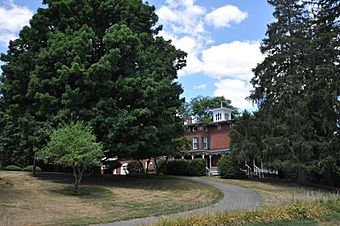Eli Phelps House facts for kids
Quick facts for kids |
|
|
Eli Phelps House
|
|
 |
|
| Location | 18 Marshall Phelps Rd., Windsor, Connecticut |
|---|---|
| Area | 1.3 acres (0.53 ha) |
| Built | 1860 |
| Architectural style | Italianate |
| MPS | 18th and 19th Century Brick Architecture of Windsor TR |
| NRHP reference No. | 88001487 |
| Added to NRHP | September 15, 1988 |
The Eli Phelps House is a really old and cool house in Windsor, Connecticut. It was built around 1860. This house is a great example of a building style called Italianate architecture. It's one of the biggest and fanciest brick houses in Windsor from that time! Because it's so special, it was added to the National Register of Historic Places in 1988.
About the Eli Phelps House
The Eli Phelps House stands in a neighborhood in northern Windsor. You can find it on Marshall Phelps Road.
What Does It Look Like?
This house is a two-story building made of brick. It has a flat roof with wide edges. These edges are held up by fancy brackets, which are a key part of the Italianate style. On top of the roof, there's a small, square tower called a cupola. The cupola also has a bracketed roof. It has groups of cool round-arch windows on each side.
The north and south sides of the house have parts that stick out. These are two-story window bays shaped like polygons. Most windows are simple rectangles. They have stone sills and lintels, which are the stone pieces above and below the window. A porch wraps around the east and south sides of the house. It's only one story tall. At the back, a two-story brick section connects the house to a brick carriage house.
Who Built It and Why Is It Special?
The Eli Phelps House was built around 1860. A farmer named Eli Phelps had it built. He grew tobacco, which was a very important crop back then. The large size and fancy style of this house show how successful farmers in Windsor were in the mid-1800s.
Out of all the Italianate houses still standing in Windsor, this one is the biggest. It also has the most detailed and elaborate design. That's why it's considered a very important historical building!



